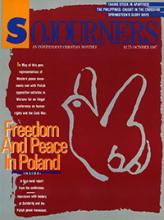JAN KAVAN WAS a student leader during the late 1960s in Czechoslovakia. After the 1968 Soviet invasion and subsequent crackdown in Czechoslovakia, Kavan was forced into exile in England. There he founded the Jan Palach Press to distribute the literature and statements of Charter 77 and other Czech oppositionists to a Western audience. He is also editor of the East European Reporter, which features the views of independent activists and movements from throughout the Soviet bloc.
In his capacity as a link between East and West, Kavan has played a key role in the process of dialogue between the Western peace movements and the independent human rights and peace groups in the East. He was interviewed by Danny Collum and Polly Duncan when he visited Sojourners' office in late May of this year.
--The Editors
Sojourners: You told us that over the past six years of dialogue between Eastern human rights activists and Western peace groups you've seen a convergence of views on the relationship of their struggles and even the potential for coalition. This process is obviously still in embryonic stages, but if you could allow yourself to dream about where it might go, what would your dreams be?
Jan Kavan: If I'm allowed to dream, ha! Good question. A Czech poet of the period between the world wars once wrote that you kill your dreams by implementing them. Nonetheless, I do have dreams--some short-term and some long-term. But they're all dreams. And bear in mind that all the different components of my dreams could easily be altered. This is more an indication of a tendency rather than a blueprint of how to achieve it. I'm quite flexible with my dreams. That said, I could perceive, for example, the following dream.
Read the Full Article

